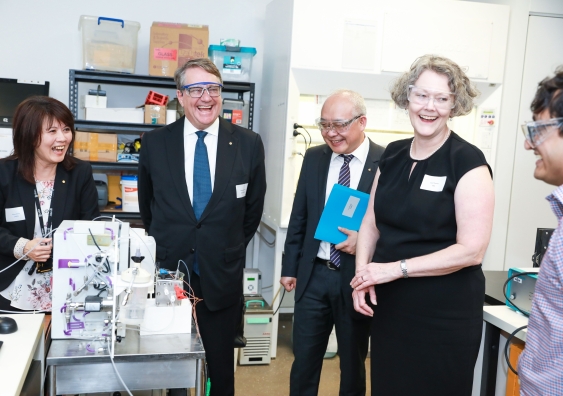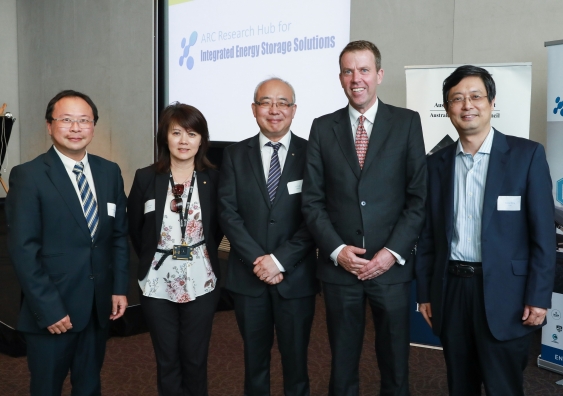Federal Minister for Education Dan Tehan was on hand at the University of New South Wales (UNSW) last week to launch the ARC Research Hub alongside scientific and technological leaders. The world-class facility aims to develop energy storage technologies to aid the nation’s, and the world’s, transition to renewable energies through the overcoming of intermittency issues.
“What this Integrated Energy Storage Solutions Hub will embark on is absolutely vital to our nation’s future,” Tehan said. “If we are to transition our economy, then having the energy solutions to do it is absolutely vital because if we don’t, we won’t be able to transition in a way which takes all Australians with us.”
The Research Hub for Integrated Energy Storage Solutions is funded through the Australian Research Council’s Industrial Transformation Research Hubs Scheme, and led by Professor Joe Dong. The goal is to bring together experts across universities and industry to develop energy storage technologies solutions that can best capture surplus energy from renewables.
The Hub has quite a broad mandate, seeking to participate not only in areas of storage technology manufacturing but also integration, optimisation, management, life cycle assessment, and economic valuation.
In terms of batteries and supercapacitor technologies, research will be performed using vanadium, lithium-sulphur, iron-slurry and sodium-ion, and lithium-ion batteries, one focus area is a battery solution for extreme environments.
As for fuel cells, the Hub is looking to create novel and improved fuel cell technologies, specifically ammonia-based fuel cells that would better enable hydrogen export, a key part of the Australia’s National Hydrogen Strategy.
Power-to-gas falls into a similar and indeed interconnected basket, for research into advanced catalytic systems for power-to-gas conversion is looking to extend the capability of fuel cell technology to allow for direct input from renewable energies like solar PV.
The Hub will see cooperation between 14 participating Australia and international organisations. UNSW President and Vice-Chancellor, Professor Ian Jacobs said the new hub will allow UNSW researchers to collaborate closely with colleagues from the University of Technology Sydney (UTS) and Deakin University.

Image: UNSW
“We need to take the world-class research being done at Australian universities and translate it into industrial solutions. And that is precisely what this Research Hub will do,” Jacobs said. “Improving the lives of people around the world is an ambition shared by all universities and I am supremely confident the Hub will make an enduring contribution to that goal.”
Deputy Vice-Chancellor (Research) Professor Nicholas Fisk noted the Hub team’s spectacular credentials, marking the research in the energy storage space as “essential for tackling the intermittency bugbear of renewable energy.”
One such credentialed researcher is chemical engineer and Scientia Professor Rose Amal, the 2019 NSW Scientist of the Year and now leading the Power-to-gas theme of the ARC Research Hub as part of UNSW’s Particles and Catalysis Research Group.
This content is protected by copyright and may not be reused. If you want to cooperate with us and would like to reuse some of our content, please contact: editors@pv-magazine.com.









By submitting this form you agree to pv magazine using your data for the purposes of publishing your comment.
Your personal data will only be disclosed or otherwise transmitted to third parties for the purposes of spam filtering or if this is necessary for technical maintenance of the website. Any other transfer to third parties will not take place unless this is justified on the basis of applicable data protection regulations or if pv magazine is legally obliged to do so.
You may revoke this consent at any time with effect for the future, in which case your personal data will be deleted immediately. Otherwise, your data will be deleted if pv magazine has processed your request or the purpose of data storage is fulfilled.
Further information on data privacy can be found in our Data Protection Policy.